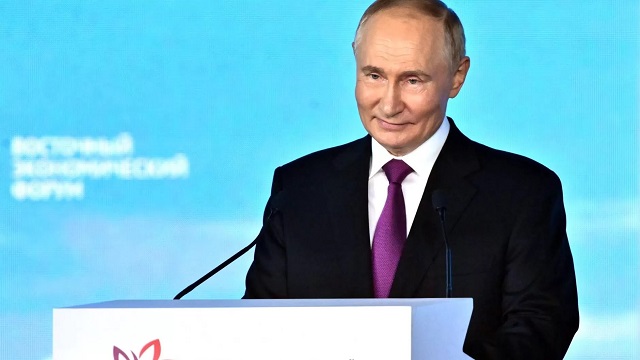International
Why You Shouldn’t Fret Much Over Russian Election Interference

From The Rattler
By J.D. Tuccille
Governments are always screwing with other countries politics. It’s often ineffective.
If you missed the news, Russians are interfering in American politics again. If you missed history, Russians are always interfering in other countries’ politics—and so is everybody else, including the U.S. Screwing around with foreign elections is a popular sport for the world’s regimes, though it’s not clear that websites, bogus social media accounts, and funds funneled to a political-commentary network will return more bang for Putin’s rubles than did past social media shenanigans.
Russia, Again
“The Justice Department today announced the ongoing seizure of 32 internet domains used in Russian government-directed foreign malign influence campaigns colloquially referred to as ‘Doppelganger,’ in violation of U.S. money laundering and criminal trademark laws,” according to a September 4 government press release. “In conjunction with the domain seizures, the U.S. Treasury Department announced the designation of 10 individuals and two entities as part of a coordinated response to Russia’s malign influence efforts targeting the 2024 U.S. presidential election.”
The indictment specified “the defendants, have deployed nearly $10 million, laundered through a network of foreign shell entities, to covertly fund and direct U.S. Company-I [which] publishes English-language videos on multiple social media channels, including TikTok, Instagram, X, and YouTube.”
“Many of the videos published by U.S. Company-I contain commentary on events and issues in the United States, such as immigration, inflation, and other topics related to domestic and foreign policy,” adds the indictment. “While the views expressed in the videos are not uniform, the subject matter and content of the videos are often consistent with the Government of Russia’s interest in amplifying U.S. domestic divisions in order to weaken U.S. opposition to core Government of Russia interests, such as its ongoing war in Ukraine.”
Based on details in the indictment, Company-1 has been identified as Tenet Media (since shuttered), which managed a stable of right-wing pundits including Lauren Southern, Tim Pool, Taylor Hansen, Matt Christiansen, Dave Rubin, and Benny Johnson. The company promoted, the indictment says, “nearly 2,000 videos that have garnered more than 16 million views on YouTube alone.”
Very nefarious, right? Well, maybe not. While Tenet founder Lauren Chen has gone quiet and lost her gig with Blaze TV and channels on YouTube, Tenet’s contributors seem baffled by the whole thing.
“The Culture War Podcast was licensed by Tenet Media, it existed well before any license agreement with Tenet and it will continue to exist after any such agreement expires,” insists Tim Pool. “Never at any point did anyone other than I have full editorial control of the show.”
Benny Johnson also says, “I am the only person who ever had editorial control of my program.”
Translated Russian documents outlining a “guerilla media campaign in the United States” caution their intended audience that “in the United States there are no pro-Russian and/or pro-Putin mainstream politicians or sufficiently large numbers of influencers and voters. There is no point of justifying Russia and no one to justify it to.” The campaign was meant to exploit “the high level of polarization of American society” by paying commentators to say things they were already saying.
It’s not clear they got a lot of mileage from that program.
Not a Lot of Bang for the Ruble
“Numbers like those might sound impressive,” independent journalist Ken Klippenstein wrote of the Tenet pundits drawing 16 million YouTube views after receiving $10 million. “But my Twitter analytics informs me that over the past year, my posts garnered 463 million views. So Russia’s dastardly scheme reached a small fraction of the people my dumbass posts do.”
That’s typical for foreign meddling in our already messy domestic politics.
“It would appear unlikely that the Russian foreign influence campaign on Twitter could have had much more than a relatively minor influence on individual-level attitudes and voting behavior,” concluded a 2023 analysis of Russian interference in the 2016 election published in the journal Nature Communications. The authors added, “we did not detect any meaningful relationships between exposure to posts from Russian foreign influence accounts and changes in respondents’ attitudes on the issues, political polarization, or voting behavior.”
In 2020, foreign influencers worked against each other, including supposed allies in the latest Axis of Evil. A 2021 report from the government’s National Intelligence Council, which reports to the Office of the Director of National Intelligence (ODNI), found “Russian President Putin authorized, and a range of Russian government organizations conducted, influence operations aimed at denigrating President Biden’s candidacy and the Democratic Party” while “Iran carried out a multi-pronged covert influence campaign intended to undercut former President Trump’s reelection prospects.” Also meddling were forces including “Lebanese Hizballah, Cuba, and Venezuela.”
This sort of sounds like a cost-effective means of funding U.S. elections—just let foreign intelligence operations pay for them. But the ODNI report cautioned these schemes “undermine public confidence in the electoral process and US institutions, and sow division and exacerbate societal tensions in the US.” Which means getting us upset and pointing fingers about foreign interference is a goal of these schemes.
The same can almost certainly be said when U.S. agencies join the fun.
Election Interference Is a Game the U.S. Also Plays
“I was alarmed in 2016 by how policymakers and commentators frequently described Russian interference in our election as unprecedented,” according to the Wilson Center’s David Shimer, who wrote Rigged (2020) on the topic. “Many former CIA officers told me in interviews that they viewed the ’48 operation in Italy as the agency at its best. And in the aftermath of that operation, as the CIA’s chief internal historian put it to me, the agency and the KGB went toe to toe in elections all over the world.”
The National Endowment for Democracy, founded by Congress in 1983, is “dedicated to fostering the growth of a wide range of democratic institutions abroad, including political parties, trade unions, free markets and business organizations.” It does so through “grants to support the projects of non-governmental groups abroad.” I find the NED and its goals less troublesome than those of Russians funding U.S. political pundits, but I bet lots of people elsewhere disagree. Fundamentally, it’s all part of the same international contest to screw with the internal debates of allies and adversaries alike.
So, take reports of Russian interference in American elections with a grain of salt, knowing that Putin is paying Americans to say what they already believe, and the U.S. does the same in other countries. Importantly, none of that interference prevents you from making your own decisions.
|
|
Business
Feds pull the plug on small business grants to Minnesota after massive fraud reports

The Small Business Administration is moving to freeze grant money flowing into Minnesota after explosive allegations of large-scale fraud tied to state oversight failures, with SBA Administrator Kelly Loeffler signaling an immediate crackdown following recent independent reporting.
In a series of comments shared publicly by conservative commentator Benny Johnson, Loeffler said the agency is “cutting off and clawing back” SBA grants to the state while investigators dig deeper into what she described as a rapidly expanding fraud network.
Johnson wrote that Loeffler told him she was “disgusted and sickened” after reviewing footage from YouTuber Nick Shirley, whose on-the-ground reporting in Minnesota highlighted what he said were sham daycare and learning centers collecting millions in public funds despite showing little or no sign of legitimate operations.
According to Johnson, Loeffler blamed the situation on Democrat Gov. Tim Walz, accusing his administration of refusing to enforce basic rules governing small businesses and allowing fraud to flourish unchecked.
Johnson said Loeffler told him SBA investigators were able to identify roughly half a billion dollars in suspected fraud within days of focusing on Minnesota, calling the operation an “industrial-scale crime ring” that ripped off American taxpayers.
“Pending further review, SBA is freezing all grant funding to the state in order to stop the rampant waste of taxpayer dollars and uncover the full depth of fraud,” Loeffler said, according to Johnson’s account, adding that the total scope of the scheme remains unknown and could reach into the billions.
The controversy gained national traction after Shirley posted video of himself visiting multiple facilities, including a South Minneapolis site known as the Quality Learning Center, which he reported was approved for federal aid for up to 99 children but appeared inactive during normal business hours.
The center’s sign, Shirley noted, even misspelled the word “learning” as “learing.”
In the footage, a woman inside the building is heard shouting “Don’t open up,” falsely claiming Shirley and his colleague were Immigration and Customs Enforcement agents.
After the video circulated, Rep. Tom Emmer, a Republican, publicly demanded answers from Walz, questioning how such facilities were approved for millions in taxpayer funding.
Shirley’s reporting followed earlier investigations, including a November report by City Journal alleging that members of Minnesota’s Somali community had sent millions of dollars in stolen taxpayer funds overseas, with some of that money reportedly ending up in the hands of Al-Shabaab, a U.S.-designated terrorist organization.
While Walz’s administration has insisted it takes fraud seriously, the SBA’s decision to halt grant funding marks one of the most aggressive federal responses yet, underscoring how rapidly a local scandal has escalated into a national reckoning over oversight, enforcement, and accountability in Minnesota.
Digital ID
The Global Push for Government Mandated Digital IDs And Why You Should Worry

From StosselTV
Countries all over the world are imposing digital IDs. They tie your identity to everything you do. Spain’s Prime Minister wants “An end to anonymity online!”
Tech privacy expert Naomi Brockwell @NaomiBrockwellTV warns that’s dangerous. “Privacy is not about hiding,” she tells Stossel TV producer Kristin Tokarev. “It’s about an individual’s right to decide for themselves who gets access to their data. A Digital ID… will strip individuals of that choice.”
The new government mandated digital IDs aren’t just a digital version of your driver’s license or passport. “It connects everything,” Brockwell explains. “Your financial decisions, to your social media posts, your likes, the things that you’re watching, places that you’re going… Everything you say will be tied back to who you are.”
And once everything runs through a single government ID, access to services becomes something you need permission for. That’s already a reality in China where citizens are tracked, scored, and punished for “bad” behavior.
Brockwell warns the western world is “skyrocketing in that direction.” She says Americans need to push back now.
———
To make sure you receive the weekly video from Stossel TV, sign up here: https://www.johnstossel.com/#subscrib...
———
-

 Digital ID2 days ago
Digital ID2 days agoCanadian government launches trial version of digital ID for certain licenses, permits
-

 Agriculture2 days ago
Agriculture2 days agoEnd Supply Management—For the Sake of Canadian Consumers
-

 Alberta2 days ago
Alberta2 days agoAlberta Next Panel calls to reform how Canada works
-

 International1 day ago
International1 day agoGeorgia county admits illegally certifying 315k ballots in 2020 presidential election
-

 Business1 day ago
Business1 day agoThe “Disruptor-in-Chief” places Canada in the crosshairs
-

 Artificial Intelligence2 days ago
Artificial Intelligence2 days agoUK Police Pilot AI System to Track “Suspicious” Driver Journeys
-

 Energy1 day ago
Energy1 day ago‘The electric story is over’
-

 International2 days ago
International2 days agoWorld-leading biochemist debunks evolutionary theory








